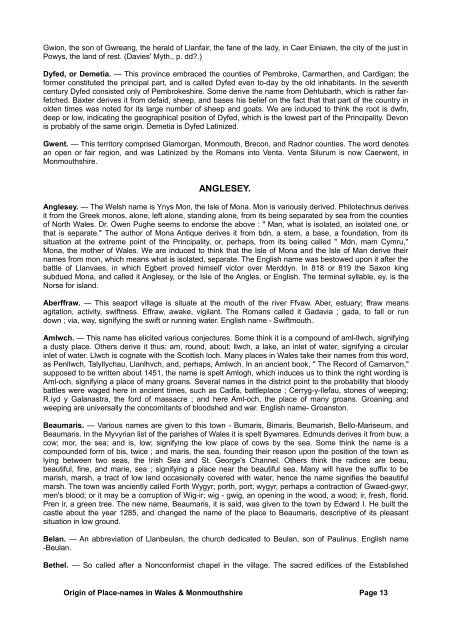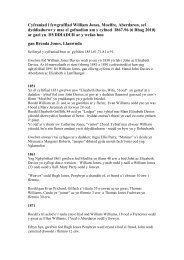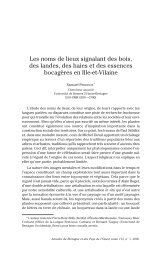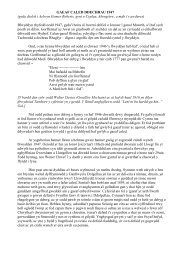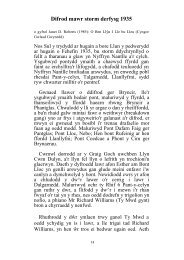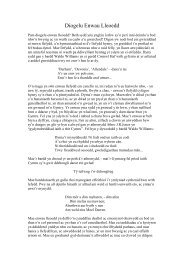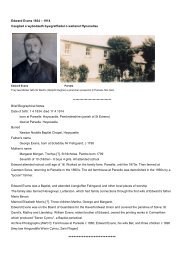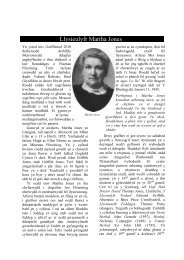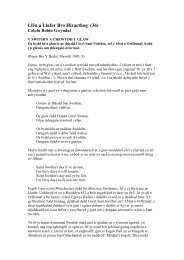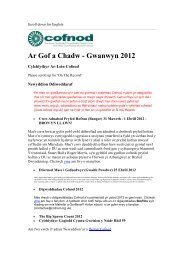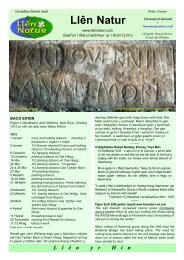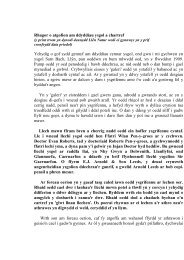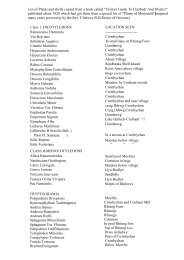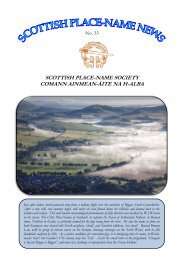handbook of the origin of place-names in wales and monmouthshire
handbook of the origin of place-names in wales and monmouthshire
handbook of the origin of place-names in wales and monmouthshire
- No tags were found...
You also want an ePaper? Increase the reach of your titles
YUMPU automatically turns print PDFs into web optimized ePapers that Google loves.
Gwion, <strong>the</strong> son <strong>of</strong> Gwreang, <strong>the</strong> herald <strong>of</strong> Llanfair, <strong>the</strong> fane <strong>of</strong> <strong>the</strong> lady, <strong>in</strong> Caer E<strong>in</strong>iawn, <strong>the</strong> city <strong>of</strong> <strong>the</strong> just <strong>in</strong>Powys, <strong>the</strong> l<strong>and</strong> <strong>of</strong> rest. (Davies' Myth., p. dd?.)Dyfed, or Demetia. — This prov<strong>in</strong>ce embraced <strong>the</strong> counties <strong>of</strong> Pembroke, Carmar<strong>the</strong>n, <strong>and</strong> Cardigan; <strong>the</strong>former constituted <strong>the</strong> pr<strong>in</strong>cipal part, <strong>and</strong> is called Dyfed even to-day by <strong>the</strong> old <strong>in</strong>habitants. In <strong>the</strong> seventhcentury Dyfed consisted only <strong>of</strong> Pembrokeshire. Some derive <strong>the</strong> name from Dehtubarth, which is ra<strong>the</strong>r farfetched.Baxter derives it from defaid, sheep, <strong>and</strong> bases his belief on <strong>the</strong> fact that that part <strong>of</strong> <strong>the</strong> country <strong>in</strong>olden times was noted for its large number <strong>of</strong> sheep <strong>and</strong> goats. We are <strong>in</strong>duced to th<strong>in</strong>k <strong>the</strong> root is dwfn,deep or low, <strong>in</strong>dicat<strong>in</strong>g <strong>the</strong> geographical position <strong>of</strong> Dyfed, which is <strong>the</strong> lowest part <strong>of</strong> <strong>the</strong> Pr<strong>in</strong>cipality. Devonis probably <strong>of</strong> <strong>the</strong> same <strong>orig<strong>in</strong></strong>. Demetia is Dyfed Lat<strong>in</strong>ized.Gwent. — This territory comprised Glamorgan, Monmouth, Brecon, <strong>and</strong> Radnor counties. The word denotesan open or fair region, <strong>and</strong> was Lat<strong>in</strong>ized by <strong>the</strong> Romans <strong>in</strong>to Venta. Venta Silurum is now Caerwent, <strong>in</strong>Monmouthshire.ANGLESEY.Anglesey. — The Welsh name is Ynys Mon, <strong>the</strong> Isle <strong>of</strong> Mona. Mon is variously derived. Philotechnus derivesit from <strong>the</strong> Greek monos, alone, left alone, st<strong>and</strong><strong>in</strong>g alone, from its be<strong>in</strong>g separated by sea from <strong>the</strong> counties<strong>of</strong> North Wales. Dr. Owen Pughe seems to endorse <strong>the</strong> above : " Man, what is isolated, an isolated one, orthat is separate." The author <strong>of</strong> Mona Antique derives it from bdn, a stem, a base, a foundation, from itssituation at <strong>the</strong> extreme po<strong>in</strong>t <strong>of</strong> <strong>the</strong> Pr<strong>in</strong>cipality, or, perhaps, from its be<strong>in</strong>g called " Mdn, mam Cymru,"Mona, <strong>the</strong> mo<strong>the</strong>r <strong>of</strong> Wales. We are <strong>in</strong>duced to th<strong>in</strong>k that <strong>the</strong> Isle <strong>of</strong> Mona <strong>and</strong> <strong>the</strong> Isle <strong>of</strong> Man derive <strong>the</strong>ir<strong>names</strong> from mon, which means what is isolated, separate. The English name was bestowed upon it after <strong>the</strong>battle <strong>of</strong> Llanvaes, <strong>in</strong> which Egbert proved himself victor over Merddyn. In 818 or 819 <strong>the</strong> Saxon k<strong>in</strong>gsubdued Mona, <strong>and</strong> called it Anglesey, or <strong>the</strong> Isle <strong>of</strong> <strong>the</strong> Angles, or English. The term<strong>in</strong>al syllable, ey, is <strong>the</strong>Norse for isl<strong>and</strong>.Aberffraw. — This seaport village is situate at <strong>the</strong> mouth <strong>of</strong> <strong>the</strong> river Ffvaw. Aber, estuary; ffraw meansagitation, activity, swiftness. Effraw, awake, vigilant. The Romans called it Gadavia ; gada, to fall or rundown ; via, way, signify<strong>in</strong>g <strong>the</strong> swift or runn<strong>in</strong>g water. English name - Swiftmouth.Amlwch. — This name has elicited various conjectures. Some th<strong>in</strong>k it is a compound <strong>of</strong> aml-llwch, signify<strong>in</strong>ga dusty <strong>place</strong>. O<strong>the</strong>rs derive it thus: am, round, about; llwch, a lake, an <strong>in</strong>let <strong>of</strong> water, signify<strong>in</strong>g a circular<strong>in</strong>let <strong>of</strong> water. Llwch is cognate with <strong>the</strong> Scottish loch. Many <strong>place</strong>s <strong>in</strong> Wales take <strong>the</strong>ir <strong>names</strong> from this word,as Penllwch, Talyllychau, Llanlhvch, <strong>and</strong>, perhaps, Amlwch. In an ancient book, " The Record <strong>of</strong> Carnarvon,"supposed to be written about 1451, <strong>the</strong> name is spelt Amlogh, which <strong>in</strong>duces us to th<strong>in</strong>k <strong>the</strong> right word<strong>in</strong>g isAml-och, signify<strong>in</strong>g a <strong>place</strong> <strong>of</strong> many groans. Several <strong>names</strong> <strong>in</strong> <strong>the</strong> district po<strong>in</strong>t to <strong>the</strong> probability that bloodybattles were waged here <strong>in</strong> ancient times, such as Cadfa, battle<strong>place</strong> ; Cerryg-y-llefau, stones <strong>of</strong> weep<strong>in</strong>g;R.iyd y Galanastra, <strong>the</strong> ford <strong>of</strong> massacre ; <strong>and</strong> here Aml-och, <strong>the</strong> <strong>place</strong> <strong>of</strong> many groans. Groan<strong>in</strong>g <strong>and</strong>weep<strong>in</strong>g are universally <strong>the</strong> concomitants <strong>of</strong> bloodshed <strong>and</strong> war. English name- Groanston.Beaumaris. — Various <strong>names</strong> are given to this town - Bumaris, Bimaris, Beumarish, Bello-Mariseum, <strong>and</strong>Beaumaris. In <strong>the</strong> Myvyrian list <strong>of</strong> <strong>the</strong> parishes <strong>of</strong> Wales it is spelt Bywmares. Edmunds derives it from buw, acow; mor, <strong>the</strong> sea; <strong>and</strong> is, low; signify<strong>in</strong>g <strong>the</strong> low <strong>place</strong> <strong>of</strong> cows by <strong>the</strong> sea. Some th<strong>in</strong>k <strong>the</strong> name is acompounded form <strong>of</strong> bis, twice ; <strong>and</strong> maris, <strong>the</strong> sea, found<strong>in</strong>g <strong>the</strong>ir reason upon <strong>the</strong> position <strong>of</strong> <strong>the</strong> town asly<strong>in</strong>g between two seas, <strong>the</strong> Irish Sea <strong>and</strong> St. George's Channel. O<strong>the</strong>rs th<strong>in</strong>k <strong>the</strong> radices are beau,beautiful, f<strong>in</strong>e, <strong>and</strong> marie, sea ; signify<strong>in</strong>g a <strong>place</strong> near <strong>the</strong> beautiful sea. Many will have <strong>the</strong> suffix to bemarish, marsh, a tract <strong>of</strong> low l<strong>and</strong> occasionally covered with water, hence <strong>the</strong> name signifies <strong>the</strong> beautifulmarsh. The town was anciently called Forth Wygyr; porth, port; wygyr, perhaps a contraction <strong>of</strong> Gwaed-gwyr,men's blood; or it may be a corruption <strong>of</strong> Wig-ir; wig - gwig, an open<strong>in</strong>g <strong>in</strong> <strong>the</strong> wood, a wood; ir, fresh, florid.Pren ir, a green tree. The new name, Beaumaris, it is said, was given to <strong>the</strong> town by Edward I. He built <strong>the</strong>castle about <strong>the</strong> year 1285, <strong>and</strong> changed <strong>the</strong> name <strong>of</strong> <strong>the</strong> <strong>place</strong> to Beaumaris, descriptive <strong>of</strong> its pleasantsituation <strong>in</strong> low ground.Belan. — An abbreviation <strong>of</strong> Llanbeulan, <strong>the</strong> church dedicated to Beulan, son <strong>of</strong> Paul<strong>in</strong>us. English name-Beulan.Be<strong>the</strong>l. — So called after a Nonconformist chapel <strong>in</strong> <strong>the</strong> village. The sacred edifices <strong>of</strong> <strong>the</strong> EstablishedOrig<strong>in</strong> <strong>of</strong> Place-<strong>names</strong> <strong>in</strong> Wales & Monmouthshire Page 13


